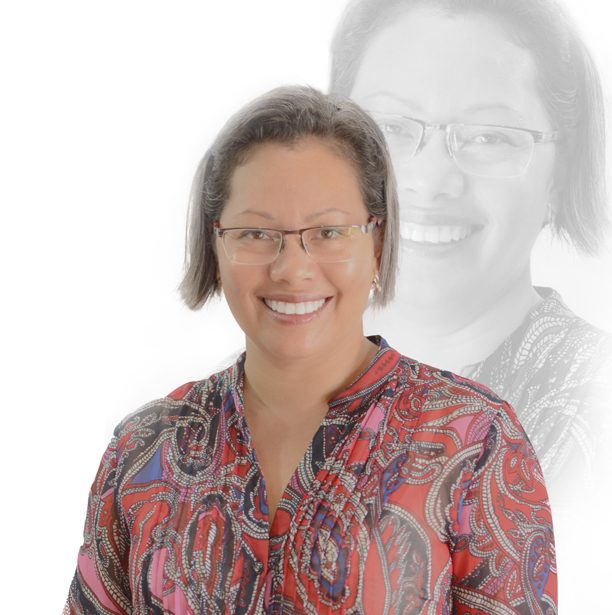With birds chirping overhead as you lounge in a recliner on the verandah and absorb the cool breeze and expansive view of the mountains, it certainly feels more like a home instead of a “home” – that dreadful word we fear as we become more and more wary of our aging parents.
The environment of Hibiscus Place, which was once a family home, is crucial to the Adult Day Centre, which aims to distinguish itself from general preconceptions of ‘elderly daycare’.
Principle of dignity for the elderlyEstablished in January 2012, Hibiscus Place Adult Day Centre is founded on the principle of dignity for the elderly, and provides a safe environment for senior citizens to not only be ‘taken care of’ but to truly enjoy themselves and participate to the fullest of their capabilities.
“We believe that no matter how old you are, you should be able to do anything you want to do within reason; you should be able to add value and still contribute to society,” explains its founder Lesley Garcia, who is an occupational therapist (OT) with over 13 years experience.
Lesley has always had a passion to help those with special needs – though finding her way to where she is now is somewhat of a happy coincidence.
OT: Making a Difference
Lesley, a former teacher of English as a foreign language, was volunteering for an English Language support hotline in Japan, when a resource book led her to a school for children with special needs in the expatriate community. It was there that she met her first occupational therapist.
More than just ‘rehab’ or ‘therapy’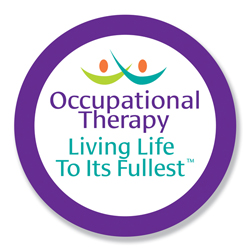
“Before that, I didn’t know there was such a job!” she laughs. “Then, as I began to formally study occupational therapy, I soon realised that it’s more than just ‘rehab’ or ‘therapy’, but about providing opportunities for people to do what they want in whatever way they define as healthy.”
One of her internships involved working at an Adult Day Centre, where she first got the idea for Hibiscus Place.
But when she returned to Trinidad in 2003, she soon realised the challenges of developing such an establishment.
“As a country, we were barely ready for traditional occupational therapists – i.e. a doctor diagnoses and refers to a therapist who will treat in a clinic,” she says. “But I wanted to do this – something non-medical, using a social and preventative model in the community.”
The Birth of a Dream: Hibiscus Place
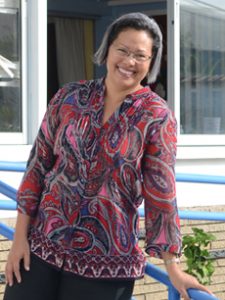
With astronomical rent prices in the areas she was interested in, Lesley put her dream on the back burner as she threw herself into a myriad of local and regional avenues for occupational therapy.
She has served as Chairperson of the Trinidad and Tobago Occupational Therapy Association – which she also founded in 2004; as President of the Association of Caribbean Occupational Therapists; and as Chairperson of the Occupational Therapy and Speech Language Board on the Council of Professions Related to Medicine.
She currently serves on the Advisory Panel of the Republic Bank’s Power to Make a Difference programme, which focused in the past cycle on programmes for people with special needs. She also started TEAM HOPE – “How Ordinary People Do Extraordinary Things” – a programme to raise awareness of the need for occupational therapy services through an innovative triathlon-training leading novice athletes to take part in the annual Neal and Massy Rainbow Cup Triathlon in Tobago.
It was Team HOPE that indirectly led to Hibiscus Place — an OT colleague led her to the house’s owners, who had seen the standard of her work on Team HOPE.
“Ironically, their house has been shut for years – during which time I had a dream but no money, and was looking for somewhere, but doing all these other things,” she reminisces. “It’s like it was waiting for me, but everything had to fall into place at the right time.”

Over the next year, guided by Lesley, the house’s owners proceeded to retro-fit the property to be suitable for Hibiscus Place, adhering to the international codes of universal design for accessibility.
International codes of universal design for accessibilitySome of the changes included putting in ramps, widening doorways, converting bathrooms to raise the toilet seats, raising the garden beds, adding railings around the gazebo at a certain height for independent walking, painting with high contrast so those with low vision can see a lot easier, and making all surfaces level as far as possible.
It’s important to allow them that kind of safe independence of movement“The more accessible your environment, the less of a burden it will be on both your participants and your staff,” Lesley explains.
“Older people can sometimes become disabled by both an inaccessible environment and by over-pampering. It’s important to allow them that kind of safe independence of movement that they may not always have at home so that they continue to use their skills.”
A Day at Hibiscus Adult Day Centre
Each enrolled participant at Hibiscus Place has an individual service plan developed through an in-depth discussion with the person and his/her family at the onset of the program. Evaluations are also done to determine the person’s physical and mental state, fine motor skills, and occupational interests.
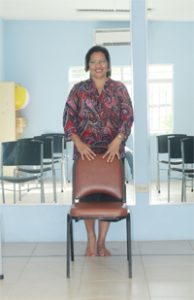
Care of the participant is then structured based on the plan. Apart from meals (which are catered on-site, and have been approved by a nutritionist to be well-balanced and suitable) some of the available activities are:
- “Stand Up” class for falls prevention
- Cooking
- Gardening
- Painting
- Crocheting
- Playing board games
- Sessions at on-site gym WOW with hydraulic equipment that can be used by the elderly
- Chair yoga
- ‘Outings’ at regular intervals such as a visit to the zoo, going to a play, or shopping at a mall
The Centre is also open to regular guest partners – for example, recently a group of children from the International School in Port of Spain visited to chat and work on projects with the participants.
And, of course, there is the natural ambience of the house… a walk in the garden, sitting on the verandah for ‘Quiet Hour’, and listening to music – not to mention playing with the Centre’s very own guinea pig, Tiger!

The Centre’s staff comes from various walks of life and each brings his/her individual skills, training, and personality. There’s Jessica, an occupational and physiotherapy assistant, who is the Programme Coordinator running the show with activities, and who does the “Stand Up” class; bubbly Charlene with a world of experience working with the elderly in England; and Vanda, who has a degree in Psychology and is also certified in yoga, and runs the chair yoga sessions.
Apart from these regular features of the programme, this coming year Lesley is looking forward to expanding the Centre’s activities by bringing on various experts to lead activities — music therapy (a piano has just been donated to Hibiscus Place!), art therapy and perhaps even tai chi! This will be quite useful for those who may not need a full day of ‘therapy’ but will enjoy doing activities in a group environment with their peers.
Emotional wellness for the family
A well-rounded programme is key to the emotional wellness of the elderly and their families, which Hibiscus Place takes quite seriously.
Role of the caregiver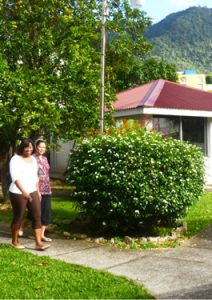
For example, last October, they held a support group for the families of the Hibiscus Place participants, to raise awareness of the role of the caregiver and discuss challenges and ways to overcome them.
“Caregivers often don’t realise the toll it takes on their own health and wellness — when you live it, sometimes you can’t really see it,” Lesley says.
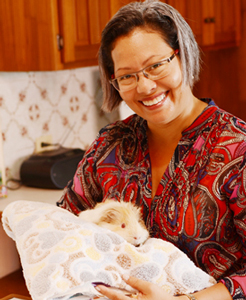
She also points out that, because the family has a lot of other demands, they can sometimes miss things — the elderly person may be having upsetting thoughts, his/her disposition may change, or he/she may be losing weight, losing control of bodily functions, or maybe experiencing pain they don’t share with loved ones. Such small changes that families can miss will be more obvious to the trained specialist, which is an added benefit of regular sessions at the Day Centre.
But, more than anything, the key benefit is satisfying that niche in our society. Hibiscus Place aims to keep older adults in their own home by providing day-time support for families.
“Unlike some first-world economies and larger countries, our local community does not cater for the oldest among the aging population, so there are few options for them,” she explains.
“They may not be ‘sick’ but boredom brings its own aches and malaise — malnutrition or weight and body issues, falls, and depression may follow. At Hibiscus, we provide the antidote to loneliness and boredom, which are the two most terrible things plaguing the elderly in Trinidad and Tobago.”
Lesley believes in the need for more communities to have places like the Day Centre, and health and wellness clusters like Hibiscus Place; and she welcomes contact from like-minded persons who may be interested.
She also intends to connect with companies to subsidise or sponsor a programme whereby elderly day therapy can be an option for retirees, as well as an added benefit and support for parents of existing staff.

